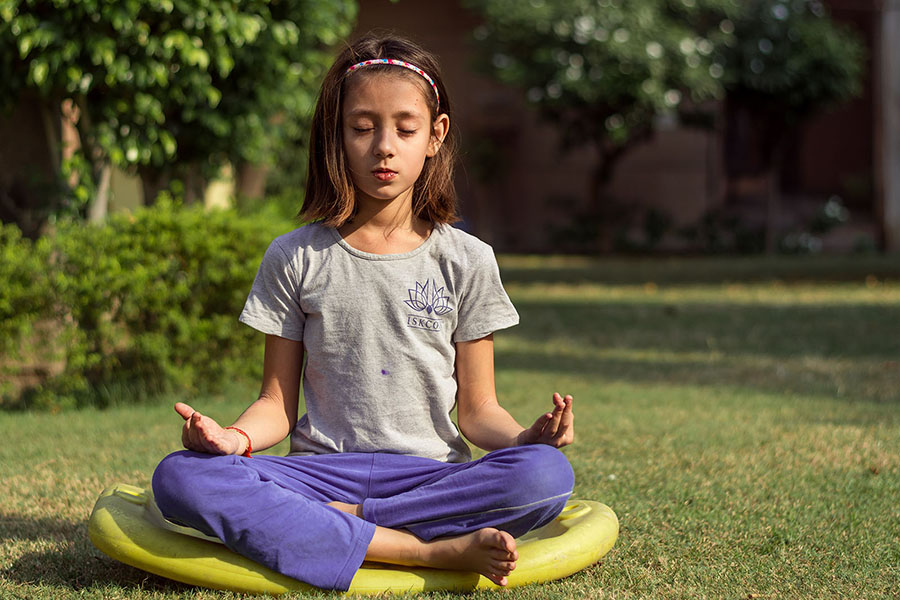
Santa Clara Meditation Science – The Scientific Relationship Between Meditation and The Frontal Lobe – Ma-eum Su-ryun
Written by Duck-Joo Lee, Professor of Aerospace Engineering, KAIST
Edited by Jung-Ah Lee
Due to politics, economy, society, and other such environmental changes, educational policies have changed many times throughout the years, but character education, which is most important, has not changed much. In Korea, the Character Education Promotion Act took effect in 2015. Overseas, meditation is gaining attention as a way to improve children’s character education and mental health (doi: 10.1007/s12671-013-0214-9). Meditation eases negative emotions and thus enhances the quality of life. Recent developments in neuroscience are scientifically proving the effects of meditation.
Changes in Adults’ Occipital Lobes and Adolescents’ Frontal Lobes
A middle school in So-Jae, Chungnam province, started a “Happy Mind Subtraction Meditation” club as an extracurricular activity during the second semester of 2015. Yang-Kyung Yoo, a professor of nursing at Gunsan University, led a team of researchers to measure and compare character and focus in the 33 students who chose to participate in this activity, before and after meditation using the ‘KEDI Character Evaluation’, developed by the Korean Educational Development Institute.
After meditation, the students had increased self-respect, consideration for others, communication skills, and self-control. These were statistically meaningful results for social responsibility, honesty, and courage. Not only did meditation release suppressed stresses, but the consistent self-reflection enabled the adolescents to break away from self-centered thought.
This means meditation can play a huge role in two goals of education in schools: proper character education and improved academic achievement. These research results were presented during the 2016 Summer Conference for Korean Society for Child Education.
Together with Jae-Mun Kim, professor of neurology at Chungnam National University Hospital, and Ki-Young Jeong, professor of neurology at Korea University Anam Hospital (currently professor of neurology at Seoul National University Hospital), I researched what changes occurred in the brains of adults and adolescents who participated in the Ma-Eum Su-Ryun Youth Character Building Camp in 2012 at Mt. Jiri. Of the 375 participants, 16 were selected to have their brainwaves measured before and after the camp. We observed the brainwave changes in 19 spots all over the head including the very center, front, back, and sides.
Results showed that alpha brainwaves decreased by about 10-12Hz in both adults and adolescents. This means that their attention spans had improved.
In adults, there was a clear change in the occipital lobe, which processes visual information. Children, however, showed changes in all areas of the brain, with particularly noticeable changes in the frontal lobe, which controls overall thinking ability. Such results make sense because adolescents are in the stage where the frontal lobe is developing.
The frontal lobe is in charge of not only planning and decision making, but also the highest level of recognition such as self-restraint, and self-control. As such, a person whose frontal lobe is well developed can respond with tact when doing their work and maintaining relationships with other people. This has significant implications for character building in adolescents.
Research has found that even smartphone and game addiction, which has emerged as a societal problem recently, could be moderated with meditation. In-Soo Lee, paramedics professor at Korea National University of Transportation, and his team conducted a study with 49 second-year high school students. 25 students participated in 20 minutes of meditation in the morning twice a week for 12 weeks while the control group of 24 students did not do any meditation. Throughout the study, their levels of addiction to their smartphones, self-control, and stress coping mechanisms were observed.
During the study, the students who had been consistently meditating showed increased ability to control their selves and manage their stress. They depended on their smartphones less and when they spent less time on their smartphones, they had weaker withdrawal symptoms that impacted their daily lives. These study results were presented during the 2015 Fall Academic Conference for Academic Society of Human Completion.
Going forward, there will be a larger demand for creativity. As such, talented individuals who have self-discipline and the ability to make decisions and act on them will garner attention. Meditation can be one way to achieve this. So how about adding meditation into the school curriculum as part of character education for adolescents?
Duck-Joo Lee
After receiving his Ph.D from Stanford University, he worked at NASA, and now works as a professor in Aerospace Engineering at KAIST. He is the current Vice Chairman of the American Helicopter Society, Vice Chairman of the Korea Drone Industry Promotion Association, and President of the first Asia-Australia Rotorcraft Forum. He has offered character education courses at KAIST, such as “Now is the Turning Point in My Life” and “Pursuit and Recovery of Human Nature”. Starting last year, he has also been serving as the President of the Academic Society for Human Completion and a founding member of the Future Education Society.
* This article was made with the consent of the author.
Source: http://dl.dongascience.com/magazine/view/S201709N053